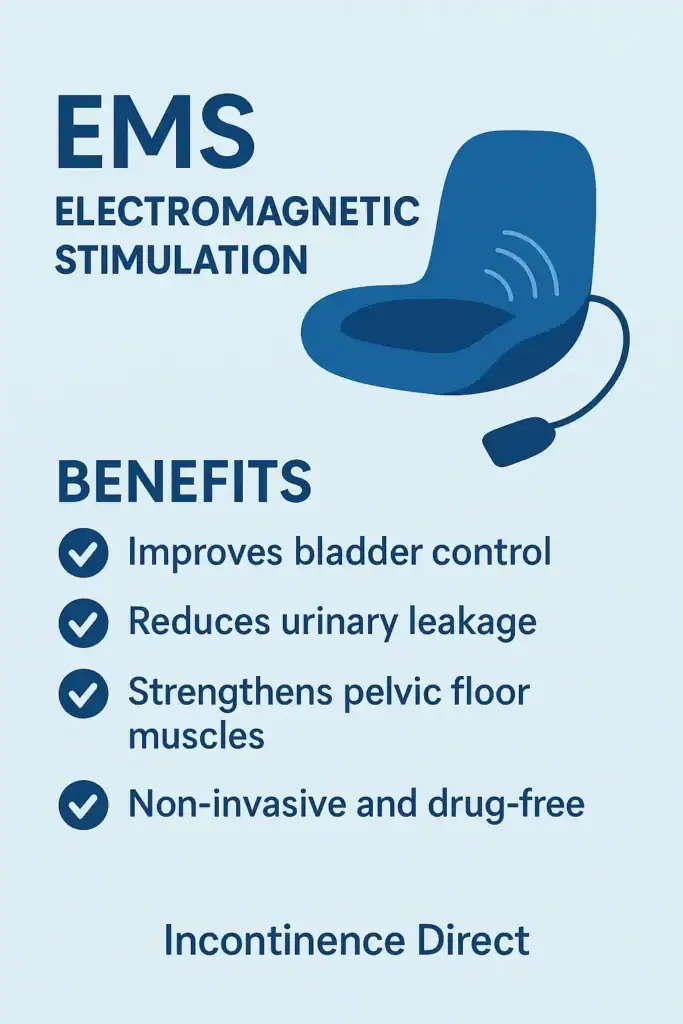Struggling with Nighttime Leaks ? Here’s How to Reclaim Your Sleep

If you’re waking up in the night because your bladder has other ideas, you’re far from alone — and you don’t necessarily have to resign yourself to broken sleep or heavy bedding. At Incontinence Direct, we know how disruptive nighttime urinary leaks (or nocturia/urge to pass urine during the night) can be—the good news: non-surgical treatment options exist. Incontinence Directs EMS (Electromagnetic Seat) treatment can improve symptoms in as little as two weeks. Helping you reclaim restful nights and confidence.
Please speak to our team today!
Why Nighttime Leaks Happen
Nighttime leaks can have several causes:
- Increased urine production or reduced bladder storage overnight.
- Overactive bladder muscles or urgency at night (urge incontinence).
- Poor bladder control due to weak pelvic floor, or underlying factors such as excess fluid intake close to bedtime, caffeine/alcohol use, medications or other health conditions.
- Mechanical or anatomical changes (especially in women post‐childbirth or in men with prostate issues) that reduce bladder control.
These night trips disrupt sleep, increase anxiety about bedding or leakage, and impact quality of life.
The Power of Non-Surgical Treatment
Many people think “surgery” is the only option — but actually, doctors often begin with non-surgical treatments. These may include lifestyle changes, bladder training, pelvic floor muscle therapy or devices, medications and other non-invasive therapies, such as Direct Incontinence EMS (Electromagnetic Seat).
Our treatments are safe and FDA-approved.
At Incontinence Direct , we focus on a non-surgical treatment that can lead to quick improvements.
What “improve in as little as 2 weeks” means:
- Initiating a focused routine of pelvic floor strengthening or bladder training
- Adjusting your fluid/caffeine/alcohol intake and timing
- Using the right incontinence absorbency and comfort products at night to reduce anxiety and disturbance
- Introducing devices or supports (e.g., nocturia‐friendly pads, bed protection) so that even if the leak isn’t eliminated yet, your sleep is far less disrupted
- Monitoring your nights and bladder/voiding habits via a “bladder diary” to identify triggers and patterns
Even these initial steps can reduce leakage episodes, help you sleep more soundly and build momentum toward longer-term improvement.
A Realistic Timeline To Stop Nighttime Leaks : What to Expect

Time: What you might notice
Week 1-2 You may feel more secure — fewer abrupt awakenings, fewer “just in case” changes of bedding, more confidence in your absorbency choice.
Weeks 2-4 The pattern may stabilise: fewer full leaks, less anxiety about bedwetting, improved sleep continuity. You’re practising behaviours that reduce nocturnal bladder stress.
Month 1-3 As your routine takes hold, you may see sustained reduction in nighttime leakage, less need to change or wake up, stronger pelvic floor responses or bladder control. You can reduce nighttime pad use or switch to a lower absorbency product.
Beyond 3 months, with consistency, you’re moving toward long-term management: fewer or no nighttime leaks, more restful nights, less disruption, and improved quality of life. At this point, you may consider additional non-surgical treatments/devices in consultation with your clinician.
Key Steps to Reclaim Sleep & Confidence And Stop Nighttime Leaks

- Keep a bladder diary: Note the times you drink, when you pass urine, how many times you wake at night, and any leakage. It helps identify triggers.
- Adjust fluids wisely: Reduce intake 1-2 hours before bed, cut back on caffeine & alcohol, especially late in the day.
- Strengthen pelvic floor muscles: Regular, correct exercises can enhance bladder support and reduce night leaks.
- Optimise your sleep & bedtime routine: Minimise bladder stimulation late at night (e.g., avoid heavy meals, alcohol, caffeine, evening medications that increase urine output).
- Use the right absorbency & bedding protection: A good nighttime incontinence pad or disposable bed protector gives peace of mind and prevents sleep disruption from worrying about leaks.
- Consider non-surgical support options, such as pelvic floor devices, bladder training aids, specialist absorbents, or nighttime incontinence underwear. In some cases, your clinician may recommend minimally invasive therapies.
- Follow up and review: Record progress at 2 weeks, 4 weeks, and 3 months. If leak frequency hasn’t improved, consult a specialist for further non‐surgical options (medication, neuromodulation, etc.).
See Our Prices & Current Promotions Here!
Why Choose Incontinence Direct ?
At Incontinence Direct, we specialise in non-surgical EMS (Electromagnetic Seat) treatment. Within 2 weeks, you can reduce or eliminate overactive bladder issues. Our treatment is even possible in the comfort of your own home, at times that fit into your schedule. Get the rest back that you deserve!
Speak to our team today about arranging treatment.
Frequently Asked Questions (FAQ) About Treating Nighttime Leaks
Q 1: Will non-surgical treatment really make a difference in 2 weeks?
Yes — while complete elimination of nighttime leaks may take longer, many people see a meaningful reduction in episodes, improved sleep quality and greater confidence within the first 1-2 weeks when they combine key lifestyle changes, pelvic floor work and the right non-surgical treatment sessions.
Q 2: What is considered a “non-surgical” treatment for nighttime leaks?
Non-surgical options include behavioural strategies (fluid timing, bladder training, pelvic floor exercises), nighttime absorbent products, devices, and, in some cases, minimally invasive therapies recommended by a clinician. Surgery is only considered if these options don’t work.
Q 3: If I still leak occasionally at night, does that mean I’ve failed?
Not at all. Improvement is a process. Reducing frequency/intensity of leakage, improving sleep continuity and enhancing quality of life are real successes. Occasional leaks don’t mean the approach isn’t working — they highlight areas to review and refine.
Q 4: Can both men and women benefit from these non-surgical approaches?
Absolutely. Nighttime urinary leaks affect many people, male or female—the underlying strategies (fluid timing, pelvic floor when applicable, right products) apply broadly. For men, prostate issues may also need to be checked in parallel.
Q 5: When should I see a clinician rather than rely just on self-help and products?
If you’re experiencing frequent night leaks despite 4-6 weeks of consistent self-management, or if you have pain, blood in urine, urinary tract infections, sudden onset of heavy leakage, or other medical issues, you should consult a specialist.
Ready to Get Started?
If nighttime leaks are disrupting your sleep, it’s time to take action. Treatment is available for all ages. You may be surprised at how much difference in your symptoms is possible in just two to four weeks.
For personalised support or product guidance, contact us and we’ll help you plan your path to more restful nights and restored confidence.



